
…or a fermenting novice at least
When I first moved to Amsterdam, I felt a certain freedom that I didn’t have in London. There was more space, I had a balcony, and after a short while I got a garden plot at I can change the world with my two hands.
This meant that I could get into gardening and finally have a wormery and other things I’d always wanted to try. So I decided to make sauerkraut. I found a traditional recipe in a magazine (with a dodgy lack of measurements) and made some. My Dutch relatives gave me a funny look when I gave them a jar as a gift and, although I tasted it, I was too scared to eat it. Silly, right?
Well, another year passed, then another, and a friend mentioned that she made kombucha at home. I had tasted some amazing kombucha at a restaurant in Thailand (the BEST restaurant I have ever been to there) and I was really interested. She gave me something called a scoby. I now know it’s a collection of bacteria and yeasts that cause the fermentation, but what it looked like was something really disgusting.
I was too scared to drink it. Silly, right?
Why are fermented foods important?
I had always heard good things about fermented foods and had learned some while studying nutrition, the main one being that it provides healthy bacteria for your gut and therefore helps support your immune system. So I decided to give a free workshop on the topic. I needed support, I needed a kick in the ass, I needed to get over my fear!
Booking this workshop through the lovely women running the Natural Wellness group forced me to do my research. I’ve read books, studies, spoken to experienced fermenters and now have run several free and paid workshops on the topic. Getting together with people who also wanted to experience the benefits of fermentation helped me get over my fear of eating around the bacteria. Get my favourite kombucha recipe here.
The 5 best reasons to become a fermentation guru
1. Preserve food
Does that sound a bit old fashioned? We live in the days of refrigeration, why would we need to preserve our food?
Well, if you’re among the growing number of urban farmers or sustainably aware people then you might be:
- Harvesting a large amount of one vegetable at a single time…there are only so many courgette quiches you can swallow!
- Buying lots of one vegetable when it’s on sale and really fresh
- Wanting your milk to last a little bit longer in the form of yoghurt, buttermilk or milk kefir
2. Increase the nutritional value
- Fermented foods are easier to chew and easier to digest. Proteins are notoriously difficult for us to break down and if we are under stress (who isn’t these days) then our ability to produce stomach acid and digestive enzymes and pepsinogen are inhibited.
- The healthy bacteria that are in your ferment produce B vitamins and other compounds that help regulate blood clotting (nattokinese), are a magnet for heavy metals (dipiccolinic acid) and have anti-cancer properties (isothiocyanides).
- Minerals are also more bioavailable.
3. Detoxify your food
Seeds and foods have certain chemicals on them that are designed to protect them from destruction. We would like to think this is just against insects and animals, but we also are a threat to them. Phytates, oxalates and cyanides are natural chemicals that are on some foods. Fermented grains are generally soaked in warm water and this helps reduce the levels of these chemicals in many grains. Some grains don’t have enough phytase in them to break down all the phytic acid.
- It increases the levels of phytase, an enzyme that breaks down phytates, which reduce zinc and iron absorption
- Oxalates have been linked to kidney stones, but are reduced with soaking and cooking in water as with taro
- Cyanides are reduced when the food is soaked (the cyanoglycosides are called linamarin in cassava and flax or amygdalin in the seeds of peach/apple/plum or taxiphyllin in bamboo shoots)
4. Improve the flavour
If you walk into a gourmet food shop you are assaulted with the beautiful aroma of fermented foods. What, you say? It’s true, foods you may commonly eat have undergone some form of fermentation, some soaking that activates or enhances the flavour of a food.
- cheese (not all, but most)
- olives are aged in a brine
- bread
- meat (proscuitto, salami)
Other foods include chocolate, coffee, vanilla, alcohol, vinegar and fish.
5. It’s fun and inexpensive
Generally when you start fermenting you gain benefits in ways you might not have thought of
- you make friends with people that ‘know’ (because you are always asking whether your ferment has gone off or not!)
- you can buy foods in bulk or on sale and save
- if you were buying fermented foods from the shop, you save by making your own
- you have amazing inexpensive gifts to give (wrapped up cleverly of course)
Am I a fermentation guru?
My fridge is regularly loaded with kimchi, sauerkraut and I drink kombucha daily. I make variations of sauerkraut, pickled green tomatoes and have made water and milk kefir as well as coconut and cow’s milk yoghurt. Does this make me a fermentation guru?
I feel like I have so much to learn yet; both about the nutritional benefits of these beautiful foods, but also in the techniques. Don’t take my word for it; venture out on your own, join a workshop, explore the fascinating world of fermentation! Here are some books I’ve used in the past:
Wild Fermentation – written by Sandor Ellix Katz
This book is written in a really natural way and encourages you to experiment. I loved the dvd that included a recording of a workshop of his; this guy likes to get his hands dirty!
The Complete Idiot’s Guide to Fermenting Foods – written by Wardeh Harmon
If you need more structure then this is the book for you. If you’re not American, you’re going to spend some time converting the ounces and gallons into metric, but there are lots of recipes and it’s more scientific.

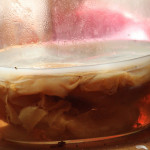
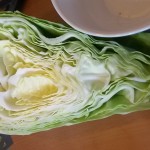

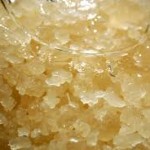
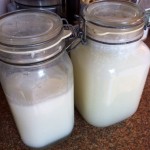
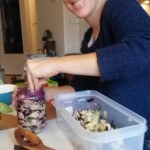

Comment
[…] fermented foods, such as kombucha, kefir, kimchi, yoghurt, sauerkraut etc as this brings in bacteria and also the […]